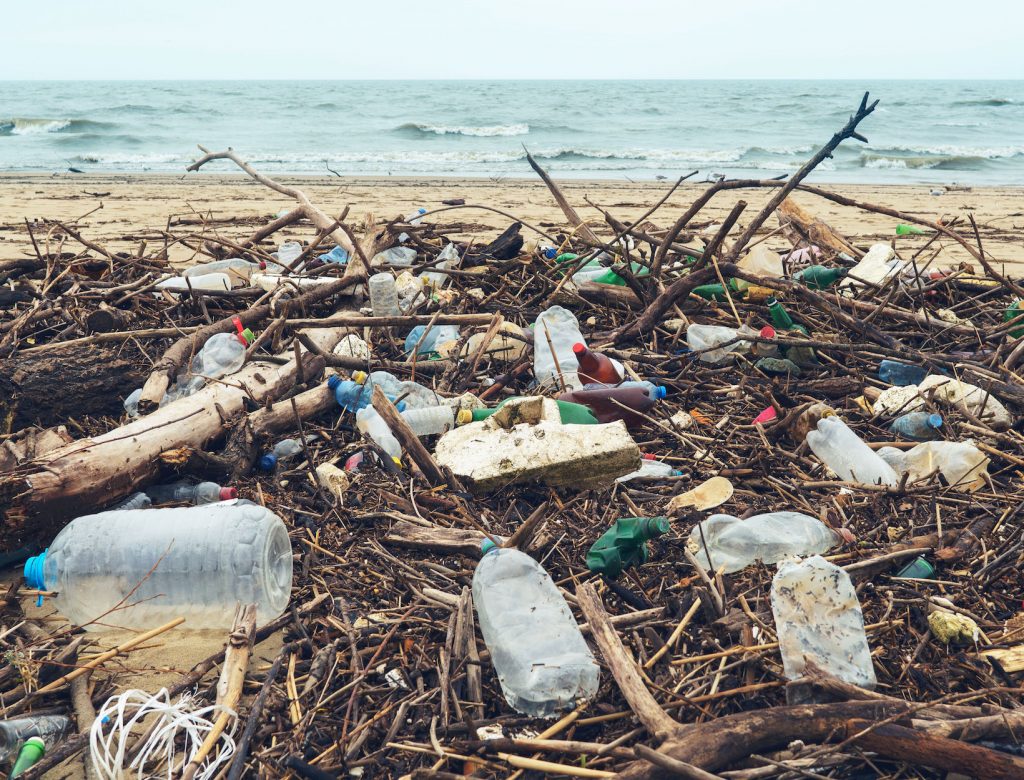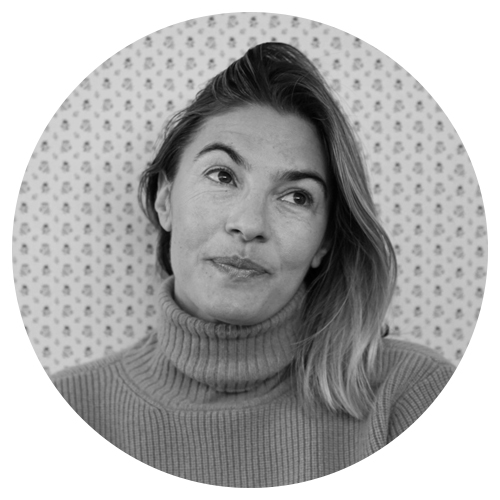
The Minimalist: The Woman Leading the Charge to End Plastic Pollution
The Woman Leading the Charge to End Plastic Pollution

Andrea Arria-Devoe, a longtime editor at Daily Candy, is the executive producer of Straws, a documentary about how ditching plastic straws can make a massive difference to the environment. In her column for goop, Arria-Devoe shares her extensive knowledge about the best countertop composter, how to shop bulk, and other hacks for living the chicest, greenest life possible.
Multimedia visual artist Dianna Cohen had been incorporating plastic bags in her art for nearly three decades before her focus took a grave turn. She saw the way the material would break down into little pieces but never go away. That stirred her scientist mind (she minored in biology) and led her to investigate the environmental impact of plastics. Once her eyes had been opened to the problem, she was determined to fix it. “When I first learned about the [The Great Pacific Garbage Patch] I imagined it was an island and I could go on a boat and pick it all up,” she says. “It’s not an island—it’s a plastic soup.”
Cohen realized that cleaning up the plastic debris is not the solution—the pollution needs to be stopped at the source. That epiphany became the biggest art project she’s ever worked on: the creation of the Plastic Pollution Coalition, a network of more than 750 organizations and individuals committed to stopping plastic pollution and its toxic impact on humans and the environment.
In honor of Plastic Free July, I sat down with Cohen to talk about the gigantic issue of plastic pollution, the evolution of the coalition—which will soon be celebrating its ten-year anniversary—and how we can all get involved.
A Q&A With Dianna Cohen
We are a global alliance of thought leaders and groups working together to stop the flow of plastic into our environment. Our projects have grown over the last nine years and now include the Last Plastic Straw and Refill Revolution, a movement adopted by music festivals, including Bonnaroo, and musicians, including Bonnie Rait, Ben Harper, Jackson Browne, and Jack Johnson, to move away from a throwaway mind-set by incentivizing the use of reusable stainless steel cups. Bonnaroo has diverted more than 2 million plastic bottles and cups from landfill over the past three years. Another of our concepts, the Plastic Free Island Project, brings community stakeholders together to reduce and eliminate single-use plastics, like straws, bottles, and bags, on islands that are heavily affected by the problem. Kefalonia in Greece and St. John in the Virgin Islands are two examples of case studies. We’ve also created comprehensive plastic-free guides for schools and businesses and have spearheaded original, health-oriented research.
On the individual level, we see our website and social media channels as a “citizen activation portal.” Those inspire people concerned with the issue to get involved in their own communities. By sharing resources and tools, we empower people to make changes locally.
Plastic outweighs zooplankton by a ratio of thirty-six to one. Between entanglement, ingestion, and habitat disruption, plastic is ending up in spaces where wildlife lives—which is everywhere. But the biggest threat that concerns me on a personal level is the threat to our human health. My mom was diagnosed with breast cancer when she was thirty-eight and died when she was forty-two. We now know that the chemicals used to create plastic are linked to breast cancer, as well as a number of other types of cancer.
Everything that runs off into the ocean—pesticides, flame retardants, mercury, pharmaceuticals, collectively known as persistent organic pollutants—collects on the surface of plastic and is then eaten by animals. The toxic chemicals pass into the animals, then we eat the animals and ingest the toxic chemicals. And every time you eat something or drink water from a plastic container, you’re dosing yourself with synthetic estrogen. These plasticizing chemicals (phthalates and BPA) have also been identified as obesogens, a chemical compound that disrupts the normal development and balance of lipid metabolism and can lead to obesity in some cases. These chemicals are being used unmanaged, and we are the test subjects.
If you saw a train coming at your kids, you would move them out of the way. That is why you need to do everything you can to avoid plastic. EWG did an umbilical cord study and found one in nineteen babies is born prepolluted. Chemicals like BPA used in plastic have been linked to smaller penis size, boys getting breasts, early menses in girls, lower IQ, and ADD. The solution is not to buy things that are BPA-free either. The substitutes are equally bad. Dr. Antonia Califat has said that so far, the replacements are equally bad if not worse. The Plastic Pollution Coalition, in partnership with Made Safe, created The Healthy Baby Guide to offer parents better alternatives.
-
Think reusable, not disposable.
-
Cultivate the habit of bringing your own bags and baskets to the market. Some helpful hints: Put them in your car; put them by the door; put them by your bike; put them in places where you’re going to remember.
-
Refuse plastic straws when you’re at a restaurant. If you really need or enjoy a straw, invest in a reusable steel or glass straw and carry your own.
-
Shift your habit to bringing your own water bottle. And if you don’t feel like carrying a bottle, bring a ceramic, steel, or glass cup. If you get takeaway coffee every day, you’re going to save money by bringing your own mug, and it’s way more stylish and cool. Make it a fashion statement. Don’t be caught eating or drinking out of plastic. Take photos of your reusable gear, share them on social media, and add #PlasticFreeJuly. And if you want it to come up on our feed, add #plasticpollutes.
I wake up every day full of hope! I feel really inspired and challenged because there is so much great stuff happening in the global movement right now and young people are really stepping up and taking action, like Hannah Testa of Hannah4Change; Melati and Isabel Wijsen, the founders of ByeByePlasticBagsBali; and Shelby O’Neill, the founder of #NoStrawNovember, Jr. Ocean Guardians, and Heirs to Our Oceans. Those young women and men have taken the lead and are driving for change.
We are seeing examples of incredible companies, like IKEA and Dell, stepping up and making huge commitments to phase out single-use plastics. Carnival Cruise Lines just dedicated to giving straws upon request only, and Starbucks recently committed to eliminate plastic straws by 2020.
The greatest challenge has been the plastic industry and a lot of false solutions and greenwashing. For instance, the plastic industry likes to argue that we can clean up the mess versus focusing on source reduction and creating with different materials and system redesign. If more companies were 100 percent responsible for their packaging from beginning to end that would make a huge difference.
The convenience concept was taught and marketed to us—it’s not really more convenient to buy a new plastic bottle every time you need a drink. Industry manipulated us and put the onus of waste on the consumer. What the Plastic Pollution Coalition has been able to do is educate people and stop them from feeling guilty. We help people recognize that it is not our responsibility or the responsibility of our children to be cleaning up everything all the time. We need to help everyone to make that connection to the kind of system change that we need.
We are preparing to launch our Global Legislative Plastic Reduction Toolkit Advocacy, which will exist online and allow people to access resources, templates, sample language, and tools from around the world to measurably reduce single-use plastic. The first section will focus on plastic bags. People contact us all the time asking for sample language and feedback on policy for bag and straw legislation, and we are well positioned to provide access to these resources.
How far we’ve moved the needle in terms of awareness. I meet people all the time and when I say, “I’d like to get the tap water or no straw please,” people ask, “Is that because a lot of plastic is getting in the ocean?” “Is that because of the sea turtle?” “Is that because if a plastic bottle is left out in the sun it can leach?” And my answer is YES. It’s always yes. I want to reward people if they have the tiniest bit of knowledge.
Another proud accomplishment is seeing how people have embraced the fifth R: refuse. I like to look at refusing single-use plastic as a creative challenge. It’s especially fun to do with kids. Kids love saying no. They want you to give them permission to say no to stuff.
We have been advising the Earth Day Network on their Plastic Pollution guidebook and campaign; supporting the United Nations on their “Beat Plastic Pollution” campaign for World Environment 2018. Planet or Plastic was the cover article for National Geographic last month and they have made a multiyear commitment to cover the issue. To watch representatives from the EU get up and call it “a global plastic pollution crisis” at the United Nations Environment Assembly, the UN and at other government summits is HUGE. That is a result of our work to shift the narrative away from language like marine debris, litter, rubbish, waste, and garbage.
Dianna Cohen is an artist, an activist, and the CEO and a cofounder of the Plastic Pollution Coalition, a California-based global nonprofit that addresses and educates people on the pervasive issue of plastic pollution, alternatives, and solutions.